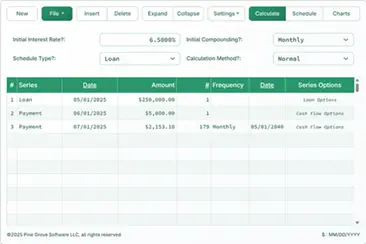Retirement Income Calculator
The Retirement Income Calculator is designed to make it very easy to answer the question, "What will my retirement income be?" It only needs you to provide a few inputs, others are optional. More details below…
The Calculator-Calculate Projected Retirement Income
Information
Calculator Details
The calculator has 11 inputs, 6 of them are required:
- Your Current age
- Annual contribution toward retirement
- and/or Current retirement savings
- ROI for retirement savings
- You want to retire at what age
- Retirement income lasts until age
- ROI during retirement
There are 5 optional inputs. Any or all can be left at 0.
- Annual contribution increase
- Current retirement savings
- Income from government
- Other annual income
- Annual inflation rate
Click on the [Help] button for more details about each input.
If "For retirement income, withdraw only interest" is checked, you'll not be able to enter a value for "Retirement income lasts until age" since withdrawing only the interest means the principal will remain untouched. Theoretically, the income will last in perpetuity. An exception to this will be if you enter a value for "Annual inflation rate", then only the first withdrawal will equal the interest earned for the year. Subsequent withdrawals will be more than the interest earned to compensate for inflation.
As you go through life there are few things you can do, from a personal finance perspective, that are more important than preparing for retirement. I hope this retirement income calculator helps you chart a path to a secure future
Other Retirement Calculators
- Retirement Age Calculator
- Retirement Savings Calculator
- Retirement Calculator — Does it all. Better on desktops or larger screens.
Retirement Income Calculator Help
Though many, if not all, of the inputs will be self-explanatory at a basic level, we suggest that you review the below information. There are various details which we point out that are important to understand.
Your current age — or the age you plan to start saving/investing.
Retirement income lasts until age — if "For retirement income, withdraw only interest" is not checked, then your retirement plan will assume you do not expect any income from your investments beyond this age.
Annual contribution increase — assumes your annual contribution will go up over the years. Enter the annual average increase that you expect. If you want to allow for inflation, then enter an amount LESS than your assumed average annual inflation rate. For example, if you expect to contribute 3% more each year and you expect inflation to average 2% a year, then enter 1% since 2% is going to be eaten up by the impact of inflation.
Annual contribution toward retirement — enter the amount you plan to save for your retirement fund. Generally speaking, the older you are, the higher the amount will have to be for you to reach your retirement income goal.
Current retirement savings — if you have already started saving, enter the total amount in your retirement account.
ROI for retirement savings — (return on investment) your expected, annualized average return on your investments. If you were to put your money in a standard saving account (not necessarily a good idea), then this would be the annual interest rate paid on the account.
You want to retire at what age — the age you want to retire. The calculator assumes your last contribution will be in the prior year and your first withdrawal will be at your retirement age.
ROI during retirement — your rate of return on your investments after you retire. You could use the same percentage as you use for "ROI for retirement savings" however, normally after one retires they invest their money in assets that are more conservative and that generates a lower rate of return.
Annual inflation rate — if you want to increase your retirement income, then enter an estimated inflation rate. Your income will increase by this amount.
Expected income from gov't — if you expect social security income or a government pension enter the annual amount. This amount plus any income from other sources will be deducted from "annual income required" to calculate the amount of income retirement your savings will have to generate.
Other annual income — if you expect income from other sources besides your retirement saving and government social security or pensions enter the annual amount. For example, if you expect a pension from an employer, enter the annual pension amount. This amount and social security will be deducted from "annual income required" to calculate the amount of income your retirement fund will have to support.

Comments, suggestions & questions welcomed...